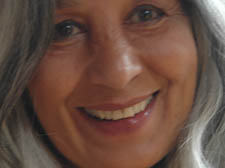| |

Mimi Khalvati |
Poems for the child that lies within
The Meanest Flower. By Mimi Khalvati. Carcanet Press £9.95. Order this book
MIMI Khalvati was born in Tehran, grew up on the Isle of Wight, and trained at the Drama Centre in Kentish Town. She is a well-loved poet and freelance poetry tutor.
The Poetry School in North London is her particular pride and joy. She lets the cat out of the bag in the first stanza of The Meanest Flower, the title-poem of her exciting new volume:
April opens the year with the first
vowel,
opens it this year for my sixtieth.
Truth to tell, I’m ashamed what a
child I am,
still so ignorant, so immune to facts.
I don’t know of any other poet who admits to being a child at heart at the beginning of a new book. The Meanest Flower is an exquisitely woven sequence of 12 poems, culminating in the fifth:
As if they were family, flowers
surround you.
As if they were a story-book, they
speak.
They speak through eyes and strange
configurations
on their faces, markings on petals,
whiskers,
mouth-holes and pointed teeth. They
are related
to wind. Wind is a kind of godfather,
high up
in the branches. They’re willing you
to listen
to them, not him.
In the last poem in the sequence, Mimi puts her finger on some of what’s gone wrong with the whole ghastly poetry world run by theoreticians:
Poetry’s on the run.
From exhaustion, the inability
to imagine a larger world and one
too sick to be hurt into words. Be
kind,
sweet April, you with your mouth, first vowel, open.
Notice how Mimi the craftswoman unites this last line with the first of this heart-warming sequence to exquisite effect. Its warmth percolates through the entire volume.
Among the poems I shall read and reread here is “Ghazal: The Children”, which I first saw in the most amazing and nourishing context of Sebastiao Salgado’s photographs of migrant and refugee children, featured in his exhibition Exodus at the Barbican Centre in London in 2003.
The simple refrain, “The children are not ours”, runs right the way through this poem, culminating in this last stanza:
The children are not ours
but you, Salgado, have brought
them
this close, this far.
I stand within a hand’s breadth
and the world that lies between
is in their eyes.
Buy this book for this one poem. You won’t be disappointed if you are still a child in your heart. |
| |
|
 |
|
| |
 |



